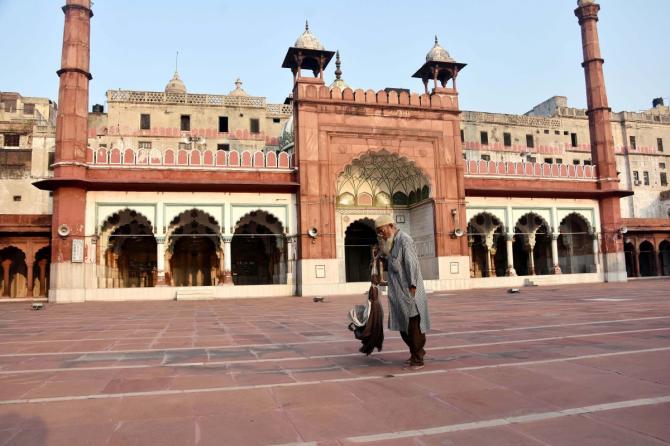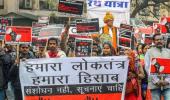'As CIC, you have the power to comment on policy matters.
'If you have very strong beliefs and you know your rulings will be reported, you will express your beliefs.'
Jyoti Punwani reports.

Was Central Information Commissioner Uday Mahurkar overstepping his brief in his comments in a recent ruling on the Delhi government paying imams' salaries?
Former CIC Shailesh Gandhi doesn't think so.
In his ruling on an RTI appeal on payment of salaries to imams in Delhi, Mahurkar, while criticising a Supreme Court judgment, brought into his criticism the creation of Pakistan, the unity and integrity of the nation, and 'social disharmony'. Giving salaries to imams amounted to 'betraying the Hindu community,' he wrote.
In an interview to Rediff.com, Gandhi says someone in a quasi-judicial position often made remarks that might, strictly speaking, not be seen as falling under his/her purview.
"As CIC, I often invoked the Constitution or Parliamentary debates in my rulings, to support the concept of transparency," he recalls.
Gandhi was CIC from 2008 to 2012. Since his retirement, he has been doing all he can to strengthen the Right to Information Act, writing to state information commissioners about how to resolve backlogs, holding workshops, writing articles, helping others in RTI battles.
"It is difficult to exactly pinpoint where the line is crossed in a CIC's ruling," says Gandhi.
The former CIC remembers that the RBI had once refused to give particulars about a bank's audit, saying that doing so would endanger the economy.
"In my ruling ordering it to give the details asked for, I remarked that the country's economy can't be so fragile as to be endangered by the audit details of one bank being made public. And if indeed it was so fragile, let it collapse!"
In another case, recalls Gandhi, somebody had sought information on the President's assets. By law, the President was not obliged to declare his/her assets, but as CIC, Gandhi ruled that from the point of view of transparency, it would be better if the President did so. "Strictly speaking, this remark could be said to be out of my domain."
The CIC was within his rights to question a judgment, says Gandhi, as long as motives were not ascribed to the judge. "I've done so too; a lot of Supreme Court judgments on RTI have been wrong in my opinion. In fact, I would say the RTI Act has been mangled out of shape by Supreme Court rulings."
However, Gandhi feels CIC Mahurkar had "gone too far" when he wrote about the creation of Pakistan in his ruling.
***
What was CIC Uday Mahurkar's ruling, against which a petition has been filed in the Supreme Court?
The CIC was hearing an appeal filed by Subhash Chandra Agrawal, who holds the Guinness World Record for having filed the maximum number of RTI applications.
Agrawal had filed an RTI application after a January 2019 Zee News report on Delhi Chief Minister Arvind Kejriwal's announcement that his government was going to raise the salaries of imams from Rs 10,000 to Rs 18,000, and of helpers from Rs 9,000 to Rs 16,000.
Zee News had further reported that Kejriwal had also announced that imams and helpers in mosques not managed by the Delhi Wakf Board would get salaries of Rs 14,000 and Rs 12,000 respectively.
The chief public information officer, revenue department, Delhi government, transferred the application to the concerned department. Dissatisfied with this, Agrawal filed an appeal, but that was not adjudicated by the First Appellate Authority.
He then filed a second appeal which was heard by the Commission.
During the hearing, the Delhi Wakf Board said it was paying honorariums, not salaries, to imams and helpers. These honorariums were being paid, the board's law officer pointed out, in accordance with a 1993 Supreme Court judgment by Justice R M Sahai, which had made it the responsibility of the State and the Delhi Wakf Board to maintain imams and others.
In response to a query from the Commission, the Wakf Board spokesperson said the Delhi government gave them an annual grant.
In his application, Agrawal had also asked whether the Delhi government was paying the salaries of priests of other minority faiths and of Hindu temples. These questions had not been answered.
In his submission before the Commission, Agrawal had mentioned that the priest of a Hindu temple near his house was getting just Rs 2,000 as salary, which showed discrimination by the Delhi government.
Agrawal also drew the Commission's attention to Article 27 of the Constitution: 'Freedom as to payment of taxes for promotion of any particular religion.
'No person shall be compelled to pay any taxes, the proceeds of which are specifically appropriated in payment of expenses for the promotion or maintenance of any particular religion or religions denomination.'
Agrawal argued that the Delhi government's policy was against the Constitution.
In his ruling, the CIC directed the Delhi Wakf Board to re-examine the application and furnish correct and detailed information to Agrawal. He also directed the Delhi CM's office to provide information regarding salaries paid to imams and others of mosques not run by the Delhi Wakf Board.

However, while castigating the Wakf Board for its lack of transparency, and asking it to pay Agrawal Rs 25,000 as compensation, the CIC described this matter as one which 'affects the provisions of the Constitution of India, and also social harmony and uniform applicability of laws for all the religion in keeping with the Constitutional direction that the citizens of all religions should be treated equally.'
Criticising the 1993 judgment as one which violated the Constitution, the CIC went on to say that it 'set a wrong precedent in the country and has become a point of unnecessary political slugfest and also social disharmony in the society.'
Then the CIC thought fit to go into 'history when it comes to giving special religious benefits to Muslim community by the State.'
Moving immediately after that to the creation of Pakistan, the CIC wrote, 'It is necessary to note that it was the policy of giving special benefits to Muslim community before 1947 that played a key role in encouraging pan-Islamic and fissiparous tendencies in a section of Muslims ultimately leading to the nation's Partition.'
Mahurkar then argued that giving salaries to imams would also be a step in that direction.
'So giving salaries to imams and others only in mosques, amounts to not just betraying the Hindu community and members of other non-Muslim Minority religions but also encouraging pan-Islamist tendencies amongst a section of Indian Muslims which are already visible. Steps like (these) severely affect interfaith harmony, as they invite contempt for the Muslims as a whole from a section of ultra nationalist population.'
Finally, the CIC directed that his ruling be sent to the law minister 'for suitable action to to ensure enforcement of provisions of Articles 25 to 28 of the Constitution of India in letter and spirit, to keep all religions of India at par in terms of payment of monthly remuneration of priests of different religions at the cost of the public exchequers...'

***
"These are his set of beliefs," says Shailesh Gandhi. "I don't agree with all of them, though I do agree with him that either priests of all faiths: Hindu, Muslim, Christian, Sikh and Buddhists should be paid salaries by the State, or none should be paid.
"But I must add that when as CIC, you have the power to comment on policy matters, then, if you have very strong beliefs and you know your rulings will be reported, you will express your beliefs."
In his rulings, recalls Gandhi, his leanings towards empowering the poor came through, as did his anger against gross injustice.
But primarily, his rulings were driven by a desire for more transparency. "Some people rate me as a fundamentalist on transparency," laughs Gandhi.
However, the primary thread that runs through CIC Uday Mahurkar's ruling is an echo of Hindutva's pet refrains against 'appeasement of Muslims' and 'discrimination against Hindus', not the need for transparency.
Feature Presentation: Aslam Hunani/Rediff.com










